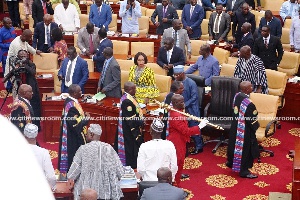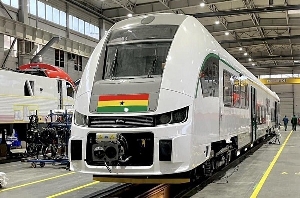- Home - Entertainment
- Lifestyle News
- Entertainment Videos | TV
- Year In Review
- Music News
- Entertainers
- Entertainment Archive
- Entertainment Photos
- Jokes
- Entertainment Headlines
- Ameyaw Debrah
- Brown GH
- Celebrities Buzz
- GH Base
- Ghana Celebrities
- Gh Gossip
- GH Page
- GH Splash
- Hot Gossip GH
- YEN

Politics of Tuesday, 11 June 2019
Source: atinkaonline.com
Most incumbent MPs are likely to lose their seats - Research
Most Incumbent Members of Parliament are likely to lose their seats to their opponents in the 2020 elections because of failed promises to voters, research has proven.
The incumbent MP’s are also likely to lose their seats if elections are to be conducted today because most of them have failed to visit their constituencies after being voted into the power.
In a research conducted by the Department of Political Science School of Social Sciences in collaboration with Konrad Adenauer Stiftung, the findings indicated that 49.5% of Ghanaians would not vote for the incumbent MPs while 42.6% were likely to vote for the incumbent MPs.
However, 7.9% were undecided when questioned if they would vote for the incumbent MP.
The study was conducted on the 275 constituencies by questioning 100 persons from each of the constituencies. 27, 500 people were interviewed in all.
Regionally, it also showed that the region with the most support for NPP incumbents if elections were held today was Oti (66.0%) where NPP has a single seat.
In the three regions where NPP has its highest number of seats, the support for the incumbents was lower with Ashanti-44 seats (45.8%), Eastern-27 seats (42.3%) & Greater Accra-21 seats (31.3%).
In four regions, more than 10% were undecided: Upper East (10.1%), Greater Accra (10.5%), Western North (16.3%) and North East (17.6%)
However, the region with the most support for NDC incumbents if elections were held today was Ahafo (60.4%) where NDC has two seats.
In the three regions where NDC has its highest number of seats, the support for the incumbents was lower: Volta-18 seats (56.4%), Greater Accra-13 seats (39.5%) & Upper East-12 seats (36.9%), while in five regions, more than 10% were undecided: Upper East (10.1), North East (10.6%), Eastern (13.1%), Western North (15.9%) & Central (16.2%)
“The ‘Yes’ vote for the incumbents ranged from a high of 90%+ to a low of less than 10% 95 of the 275 MPs would have their constituencies voting for them: 90%+ (1), 80%+ (8), 70%+ (10), 60%+ (26) & 50%+ (50). 53 others had the support of 40%-49%, 57 others had the support of 30%-39%, 40 others had the support of 20%-29%, 25 others had the support of 10%-19% and 5 others had the support of less than 10%,” the study indicated.
The findings also showed that NPP MPs have not been involved in disseminating information about government’s flagship programmes specifically One District One Factory and One Village One Dam.
When asked if MPs promised Development Projects, 88.7% said yes while 11.3% said no.
Some of the promises promised and fulfilled were to build hospitals, road construction, employment, Provision of water, provision of electrify, completion of uncompleted projects, increase the prices of farm produce and others.
On the other hand, the unfulfilled promises were to build hospitals, road construction, employment, provision of water, provision of electricity, completion of uncompleted projects and others.
It demonstrated that what people do not like about the MPs was that they do not visit the constituency, while it was difficult to communicate with most of them.
Meanwhile, in Accra, 51.6% of the participants said MPs do not visit while 56.3 also confirmed MPs do not visit in the Ashanti Region.
However, a Senior Lecturer at the Politcal Science Department of, Mr Kaakyire Frempong, advised MPs to carefully weigh their campaign promises as their constituents would hold them accountable for those promises.
“Several constituents are concerned about the continued absence of their MPs from their communities, they (the MPs) must therefore improve their levels of interaction and communication with their constituents, MPs must gauge the mood of their constituents in deciding,” he said.
Based on the report, Dr. Isaac Owusu Mensah, a Senior Lecturer at the Politcal Science Department, UG revealed that Collins Dauda, the MP for the Asutifi South is the best MP in Ghana while Dr. Matthew Opoku Prempeh, Minister of Education and MP for Manhyia South Constituency is the best Minister in Ghana per the survey.
He urged the MPs to ensure that they develop their constituencies while they make themselves available to the electorate if they want to retain their seats.
“NDC in opposition are doing well so if u are in power and you are not doing well then it is not about resources,” he added.
For his part, the MP for Banda Constituency and Deputy Minority Chief Whip, Ahmed Ibrahim who commended the researchers for their work, recommended serious engagement with all MPs on their promises.
“They have done a very good job. This is the first time their research is taking that angle focusing on the MPs. No one is perfect, we have to bring on board our experience. We should all meet as MPs to discuss this. When u promise you must promise with moderation,” he said.
The MP for Oforikrom constituency, Dr Emmanuel Marfo, who debunked the perception that MPs do not visit their constituencies after being voted into power explained that they are not able to visit the constituencies because they use most of their time to follow up projects in the interest of the constituencies.
A Member of the CPP, Rodaline Imoru Ayarna also urged the researchers to inquire why Ghanaians always voted for only NDC and NPP while they ignored all the smaller parties.
She was of the view that although most of the smaller parties had challenges with funding, most of them had what it takes to develop the country, calling for the need for funding of smaller parties.











